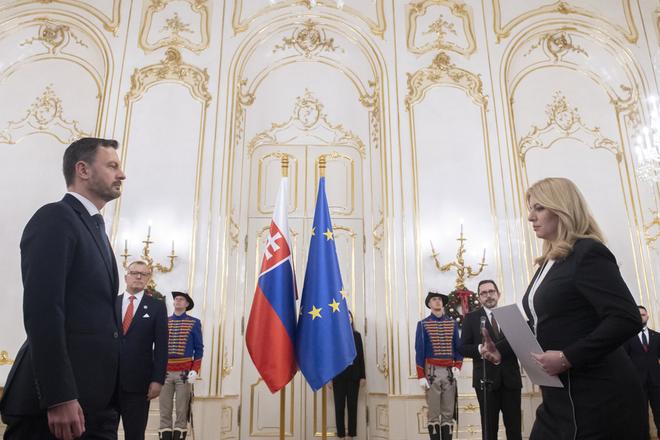President Zuzana Čaputová has officially removed PM Eduard Heger and his cabinet from power following last night’s lost no-confidence vote in parliament, while appointing Heger and his ministers at the helm of an interim government with limited powers until a new government is formed.
The president refused to comment on the often chaotic style of governing by the fallen government as, she said, she had already been critical of the government in her State of the Republic address, which she held in parliament at the end of November.
“We could see the drama that I mentioned in my address in the last minutes of your rule as well,” the president told Heger on Friday.
Heger’s interim government will depend on the president to some extent. For example, it will not be able to appoint or remove state officials without the president’s prior approval. Heger’s temporary cabinet will also lose the competence to decide on important matters in foreign policy.
Early election before summer
Because there is no political will among current political leaders to create a new government based on the current distribution of power in parliament, the president wants to see a snap election take place as soon as possible. She asked politicians on Friday afternoon to pass all the necessary legislation by the end of January 2023 to prepare the country for an early election in the first half of next year.
“Slovakia needs to return to order,” she said, stressing the importance of addressing the problems of people, not politicians.
The president hinted that she would honour her competences and take a step further if politicians failed to deliver on what she asked them to do on Friday. This means she could consider establishing a caretaker government run by technocrats, which most Slovak politicians oppose to. They argue such a government is not elected by people.
Next week, parliament will vote on an amendment that should change the constitution and should allow lawmakers to shorten the term of parliament.
Ninety votes in the 150-seat parliament are needed for the amendment to be approved.
Afterwards, political leaders will seek a deal on the date of the snap election, expected to be held in May or in June.
Heger 2.0
But not everyone is keen to hold the snap election.
Freedom and Solidarity (SaS), one of the opposition parties that initiated the no-confidence vote, does not support the idea, saying it does not want to see ex-PM Robert Fico (Smer) return to power. The politician was alleged to have been part of an organised crime group. Charges against him were recently dropped in controversial circumstances.
Smer is one of the most popular political parties in public opinion polls. It came second in the latest AKO poll for the JOJ television channel.
Instead of the snap election, SaS prefers the caretaker government or the creation of a “Heger 2.0” government. The party’s chair Richard Sulík told JOJ on Thursday night that Heger’s government was not “completely bad”, but the “Heger 2.0” cabinet, Sulík opined, would need to make some changes regarding ministers and its priorities.
One of the reasons why the government fell on Thursday was the reluctance of the prime minister to remove the flippant and conflict-seeking Finance Minister Igor Matovič, whom SaS has long criticised for his behaviour and mishandling of public finances, from the post.
In response to Sulík’s rejection of the snap-election scenario and a wish for another Heger government, Speaker Boris Kollár of the coalition Sme Rodina party told JOJ on Thursday that the wish is “nonsense” because such a government would lack support in parliament.
“You can’t poo and paint at the same time,” Kollár said, explaining that SaS cannot bring the government down and reject a snap election.
OĽaNO, the strongest coalition party led by Matovič, did not back the election before the no-confidence vote. Its post-vote position on the election is unclear.



 President Zuzana Čaputová removes Eduard Heger's government from power at the Presidential Palace on December 16, 2022, after it lost a no-confidence vote on Thursday night. (source: TASR - Martin Baumann)
President Zuzana Čaputová removes Eduard Heger's government from power at the Presidential Palace on December 16, 2022, after it lost a no-confidence vote on Thursday night. (source: TASR - Martin Baumann)